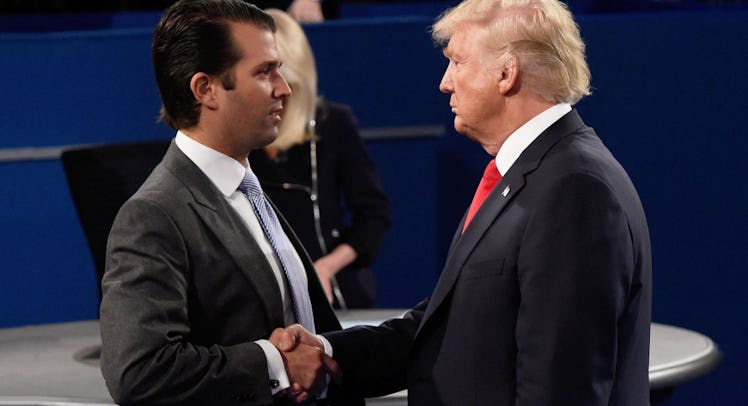What Trump Would Do and What Any Father Would Do
The Trumps have a very strange family dynamic. I get it. To the extent that it doesn’t break the law, that’s their business.

The White House has conceded that President Donald J. Trump was involved directly in crafting his son Donald Jr.’s patently false statement to the New York Times regarding a meeting with Russian operatives bearing opposition research against Hillary Clinton in 2016. Specifically, as current Press Secretary Sarah Huckabee Sanders put it, Trump “weighed in like any father would.” That press statement, made in parallel with denials from Trumps outside council Jay Sekulow, has further foregrounded an unprecedented and bizarre father-son relationship that political operatives are trying to paint as normal and healthy. The only way to do that is to redefine what a normal, healthy father-son relationship is and the push to do just that is culturally hazardous.
When Donald Trump was a candidate, he reshaped how and what we thought a candidate could be. When he assumed office, he had dramatically reshaped how we — and the world — think of the office of the President of the United States. But now he, through surrogates, he is trying to alter the position of American fathers. The normalization has come home to roost.
Look, the Trumps have a very strange family dynamic. I get it. To some extent — to the extent that it doesn’t break the law — that’s their business. But when Sanders says that Trump acted “as any father would,” I feel compelled to weigh in because I can easily disprove that falsehood. I’m a father and I wouldn’t. Wouldn’t what exactly? Well, there are a few things I wouldn’t do. Dynasty or no dynasty, I wouldn’t expose my son to potential prosecution to cover my own ass. I wouldn’t ask him to tell an easily uncovered lie, particularly one that invites both attacks and legal actions. I wouldn’t bury my boy in obfuscations.
I would not use my son to insulate myself and I wouldn’t put him in a position where that could become possible. I prefer to put my son on the bus than in front of it and endeavor to make sure he never ends up under the thing.
On one hand, you have to feel bad for Donny Jr. He may be, as his dad says, “a good boy, a good kid.” But Donny Jr. isn’t a boy or a kid these days. He’s infantilized by a father, but he won’t be by the world at large or federal prosecutors. He seems torn between two realities, one in which he is sheltered by his father’s wing, another in which is he is not. The second reality threatens to subsume the first.
But one can see how the infantilization goes both ways. Donny Jr., who has had a vexed relationship with his father in the past, has seemed to totally surrender his fate to his father’s hands. The father-son relationship is not one-sided. Sons struggle to know and understand their fathers. Donny Jr. has surely been doing that for decades. Should he be surprised to find himself under a bus, to find that the faith he has placed in either his father’s intention or aptitude was ill-advised? Not really. Donny Jr. watched his dad turn in his mother, Ivana, for a younger model. He watched the Hunger Games-ian ouster of Tiffany and the laws of primogeniture over-turned by one Jared Kushner. In effect, Donald J. Trump has been preparing Donny Jr. his entire life for this moment. It’s been one long 39-year-old wind-up.
The action most inimical to fathers is to view their sons as disposable. And yet, that’s exactly what Trump seems to be doing. As Donny Jr. is slowly quicksanded in scandal, Eric Trump, the fair-haired one, is slowly making his way to the stage as a surrogate. But even as he defends his father on Fox News and elsewhere, one wonders what sticky fate awaits him.
It would be more honest if Trump just owned the scapegoating of his children. Admirably or not, he owns a lot of his other behaviors and a lot of things. Why not his propensity for betrayal as well? That would be fine so long as he didn’t chalk the behavior up to fatherhood. He’s not “any father.” He’s a very particular man at a very particular moment in history.
The thing about fathers–most, many, a plurality, “any”– is that we hold our sons’ hands. We hug our sons. We support our sons when they need us. One thing we do not do is push them down to save ourselves.
This article was originally published on